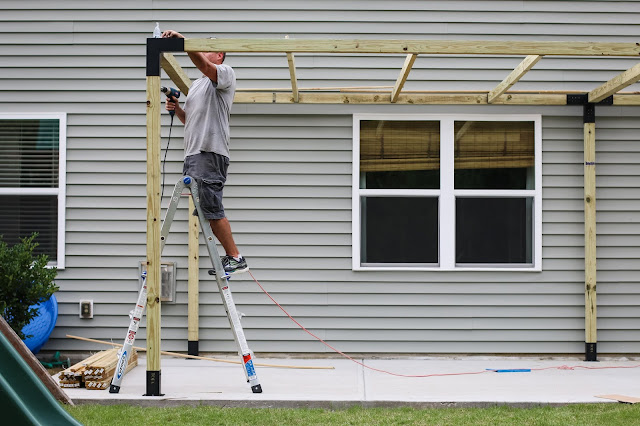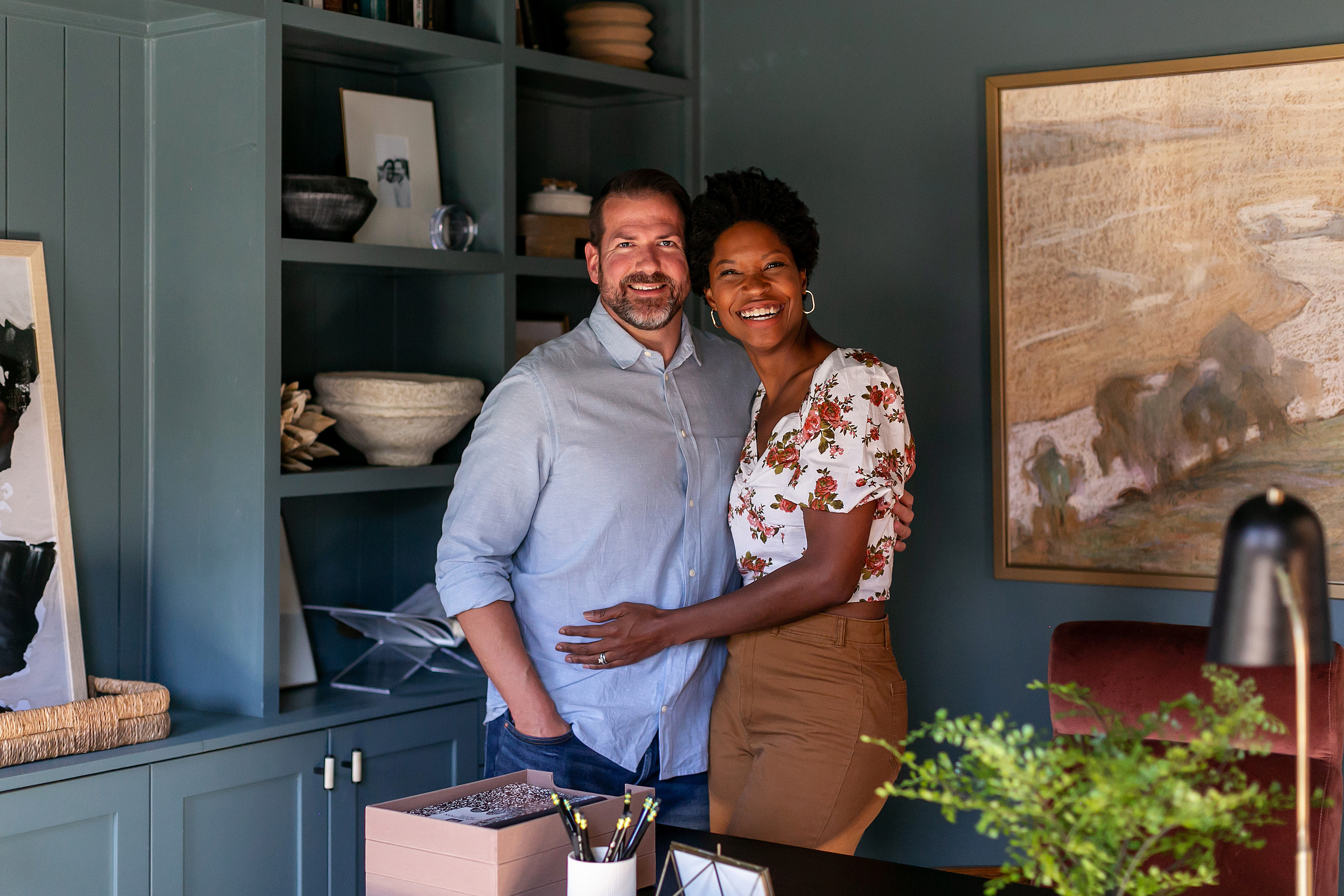How to Build a Modern Pergola with TOJA GRID
3:57 PMFirst I need to say, Joe is fully capable of DIY but he doesn't have extensive experience or free time, yet in his words, "If I can do this, anyone can." So here goes.
First, you have some decisions to make. Size? Ours is almost 12x28. Size of posts? We used 4x4s but I have to say I LOVE the look of more substantial 6x6 posts. And what style would you like? TOJA GRID has kits that include hardware for slats or a shade covering for the top. Or you can buy parts separately. We chose 2x4 rafters spaced out with 1x2 horizontal slats on top.
To customize or not to customize:
If you want a simple pergola as shown on their site, you can just order a kit! At the time they didn't have kits like this one. This makes it much easier! Even so, we wanted our pergola longer than 10 feet so we needed additional parts. We have 9 feet ceilings and we didn't want the pergola to interrupt the sightline out the window. Depending on your needs you may be able to get away with simply ordering a kit. If you're high maintenance like us, you may need to piece it together. ;)
UPDATE: Toja Grid now sells a kit that we could have used and various parts here!
Supplies:
TOJA GRID parts
Supplies:
TOJA GRID parts
-4 TRIO three-arm corner brackets
-2 QUAD four-arm extension brackets
-6 footings
-2 QUAD four-arm extension brackets
-6 footings
-Here's the listing for a double pergola kit for 4x4 wood
lumber (ours was from Home Depot)
-seven 12 ft 4x4s (for the roof frame)
-six 8 ft 4x4s (for the posts)
-six 12 ft 2x4s (for the rafters)
-60 1x2s* (for the slats)
6 packs of decorative joist hangers (12 total)
hammer drill (we borrowed one from a neighbor. Don't try to use a normal drill.)
finish nailer (we finally bought one after borrowing our neighbor's a few times).
drill bit for concrete (we used 2 b/c the first one broke- more on that later)
concrete screws
exterior nails and screws (any screws that come with the TOJA GRID kits are exterior)
To figure out how many 1x2s you need for the slats:
First, you figure out total length: for instance if your row is 144 inches, you want 8 inches between each 1x2, and each one is 2 inches wide, you divide 144 by 10 to get 15 (rounded up). So we needed 15 slats that would span 24 feet. The longest length of 1x2s available at Home Depot was 8 feet and we knew we would need to trim each one to be able to nail it at the ends to a rafter, so we needed 4 of those to get 1 row. So for 15 rows, that would be 60 1x2s. Here's the math:
144 (total distance) / 10 (total number of inches of spacing + size of slat) = 15 slats total (14.4 rounded up)
To figure out how many other pieces you need:
The maximum recommended size (per TOJA GRID) is 12 feet for length or width. Since ours was 24 feet long, we knew we needed to make it a double with the extender brackets. So we ordered 2 extender pieces. The footings are the parts that anchor into the concrete so we knew we needed 6 footings.
Assembly:
1. TOJA GRID's recommendation is to assemble the top first. We inserted the 4x4s for the top frame into the corner and extender brackets, using a mallet to make sure the wood was tightly in each bracket, and then screwed them in to secure it. We then attached the joist hangers but did not add the 2x4 rafters or 1x2 slats at this point to minimize extra weight before raising it. It took 3 guys to raise ours before those components were added.
2. Next, we lifted up one side, put 3 of the legs in, and then lifted up the other side and put the remaining 3 legs in.
3. At that point, the structure is standing and you can move it as needed.
4. Next, we put the 2x4s into the joist hangers - secured by screws that came with it.
5. Then we cut the 1x2s (slats) to size so that each end would be nailed to one of the main rafters. That way they'd be secure and look like one uniform piece all the way across from underneath.
6. Next, we nailed the 1x2s on top with a finish nail gun using exterior 18 gauge nails.
7. Finally, we anchored the footings into the cement. Take your time and cool the drill bit off in between by putting it in cold water. The older the concrete, the longer it will take- our new concrete was much easier to drill through. Joe decided to only use 2 screws rather than 4 because it was difficult to screw in the concrete screws (some broke). It felt secure enough plus the entire structure is so heavy that he felt it was too heavy to blow away. We also took into account that the top was open (not covered) so the wind wouldn't be lifting it up. But use your judgment and secure properly.
Lessons learned:
Order the brackets first and then bring one with you to test the lumber to make sure it fits before you buy it. Joe did that, but we still had issues fitting them easily into the brackets. Our posts got rained on while transporting them home and sat in the garage for about 4 weeks in 80 - 90 degree weather which caused them to expand. Because of this, they had to be shaved down at the ends to fit and hammered in with a mallet, which Joe says was the hardest part! Keep your lumber dry!
When choosing lumber, decide upfront if you want to stain it or paint it. I don't know how it was labeled but our lumber was paint grade. I tried staining it (you can watch/hear about that process here) but it just looked bad. We ended up using Behr Solid Stain in Slate and love it! But if my heart had been set on staining it, it would have been pretty disappointing.
You can see it furnished here (I haven't photographed it this year but not much has changed other than the color).
A few notes:
-I didn't take photos of every step (#badblogger) but tried to describe them as best Joe could. ;) Here's a little video of the top almost assembled prior to raising it. You can also see a few glimpses in my stories here.
-Also, this post is not sponsored but does contain affiliate links.
-Lastly, we tried searching for pergola kits to make life easy but they were just not the right size or style for us. We did love this one and this one though so if you're not up for DIY, you might want to check them out!
lumber (ours was from Home Depot)
-seven 12 ft 4x4s (for the roof frame)
-six 8 ft 4x4s (for the posts)
-six 12 ft 2x4s (for the rafters)
-60 1x2s* (for the slats)
6 packs of decorative joist hangers (12 total)
hammer drill (we borrowed one from a neighbor. Don't try to use a normal drill.)
finish nailer (we finally bought one after borrowing our neighbor's a few times).
drill bit for concrete (we used 2 b/c the first one broke- more on that later)
concrete screws
exterior nails and screws (any screws that come with the TOJA GRID kits are exterior)
To figure out how many 1x2s you need for the slats:
First, you figure out total length: for instance if your row is 144 inches, you want 8 inches between each 1x2, and each one is 2 inches wide, you divide 144 by 10 to get 15 (rounded up). So we needed 15 slats that would span 24 feet. The longest length of 1x2s available at Home Depot was 8 feet and we knew we would need to trim each one to be able to nail it at the ends to a rafter, so we needed 4 of those to get 1 row. So for 15 rows, that would be 60 1x2s. Here's the math:
144 (total distance) / 10 (total number of inches of spacing + size of slat) = 15 slats total (14.4 rounded up)
To figure out how many other pieces you need:
The maximum recommended size (per TOJA GRID) is 12 feet for length or width. Since ours was 24 feet long, we knew we needed to make it a double with the extender brackets. So we ordered 2 extender pieces. The footings are the parts that anchor into the concrete so we knew we needed 6 footings.
Assembly:
1. TOJA GRID's recommendation is to assemble the top first. We inserted the 4x4s for the top frame into the corner and extender brackets, using a mallet to make sure the wood was tightly in each bracket, and then screwed them in to secure it. We then attached the joist hangers but did not add the 2x4 rafters or 1x2 slats at this point to minimize extra weight before raising it. It took 3 guys to raise ours before those components were added.
2. Next, we lifted up one side, put 3 of the legs in, and then lifted up the other side and put the remaining 3 legs in.
3. At that point, the structure is standing and you can move it as needed.
4. Next, we put the 2x4s into the joist hangers - secured by screws that came with it.
5. Then we cut the 1x2s (slats) to size so that each end would be nailed to one of the main rafters. That way they'd be secure and look like one uniform piece all the way across from underneath.
6. Next, we nailed the 1x2s on top with a finish nail gun using exterior 18 gauge nails.
7. Finally, we anchored the footings into the cement. Take your time and cool the drill bit off in between by putting it in cold water. The older the concrete, the longer it will take- our new concrete was much easier to drill through. Joe decided to only use 2 screws rather than 4 because it was difficult to screw in the concrete screws (some broke). It felt secure enough plus the entire structure is so heavy that he felt it was too heavy to blow away. We also took into account that the top was open (not covered) so the wind wouldn't be lifting it up. But use your judgment and secure properly.
Lessons learned:
Order the brackets first and then bring one with you to test the lumber to make sure it fits before you buy it. Joe did that, but we still had issues fitting them easily into the brackets. Our posts got rained on while transporting them home and sat in the garage for about 4 weeks in 80 - 90 degree weather which caused them to expand. Because of this, they had to be shaved down at the ends to fit and hammered in with a mallet, which Joe says was the hardest part! Keep your lumber dry!
When choosing lumber, decide upfront if you want to stain it or paint it. I don't know how it was labeled but our lumber was paint grade. I tried staining it (you can watch/hear about that process here) but it just looked bad. We ended up using Behr Solid Stain in Slate and love it! But if my heart had been set on staining it, it would have been pretty disappointing.
You can see it furnished here (I haven't photographed it this year but not much has changed other than the color).
A few notes:
-I didn't take photos of every step (#badblogger) but tried to describe them as best Joe could. ;) Here's a little video of the top almost assembled prior to raising it. You can also see a few glimpses in my stories here.
-Also, this post is not sponsored but does contain affiliate links.
-Lastly, we tried searching for pergola kits to make life easy but they were just not the right size or style for us. We did love this one and this one though so if you're not up for DIY, you might want to check them out!
Please let me know if you have any questions!














20 comments
Did you need a permit from the city in order to build this in your home?
ReplyDeleteWe did not.
DeleteWhat was the cost of the cement layout?
Delete$2500
DeleteAbout how much did this cost, would you say?
ReplyDeleteAbout $3700 for the patio extension plus lumber for pergola and hardware from toja grid.
DeleteDid you need to bolt the rear frame to the house?
ReplyDeleteWe drilled it into the pavement but not into the house.
DeleteDid you need to bolt the rear frame to the house?
ReplyDeleteIs the $3700 for everything? How much was the wood & Toja Kit total? I love what you did and we already have a cement pad, so curious about the cost of the pergola itself. Thank you!
ReplyDeleteAbout $1200 at the time... (the cement was $2500).
DeleteHi! I am excited I found your blog. We are considering doing this pergola system. Do you have concrete footers in the concrete slab?
ReplyDeleteDo you happen to have the brand, size or something to search on for the fasteners you used to secure the base to the concrete? Was just at Lowes' and they had an 8x8 Toja Grid pergola in the store, but no idea how to fasten it down.
ReplyDeleteWe used the footings linked above- no other parts.
DeleteSee step 7!
DeleteHello, it turned out great! We are going to do it as well, I have a question about step 6. So the rafters and frame are flush across the top, and then the slats lay on top and are nailed in. I’m curious about your cuts and did the slats run flush to one another in between rafters?
ReplyDeleteYou mentioned 8 ft posts and your head space being 9ft. Did the extender give you the extra foot. You ordered many of your parts from that company? Thanks for your information. You encouraged me to build my own instead of the kit
ReplyDeleteHi, do the support posts agains the house sit flush with the siding? I am building one of these now and the posts lean away at the top.
ReplyDeleteHi, the support beams are about 4" from the house on bottom and top- they are relatively straight beams.
DeleteThank you very much for sharing these details! Your blog was very helpful with installing our Toja pergola. One problem we’ve run in to is our patio has a slight slope closest to the house and we can’t adjust the posts be plumb. It’s resulting in a slight tilt for our entire structure. Did you have this issue?
ReplyDelete